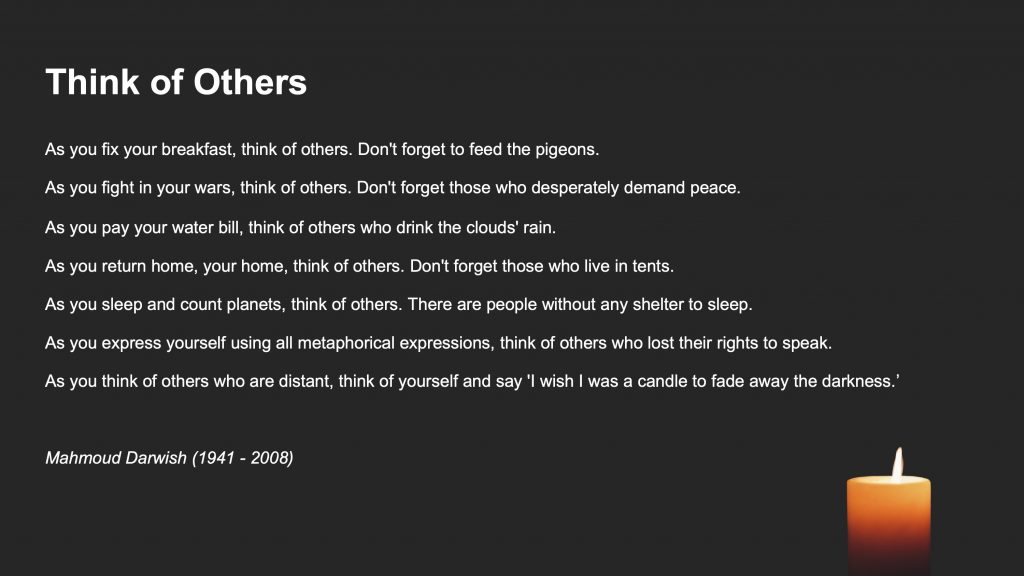Admit Complexity
This moment requires those of us in the UK not to speak in simple slogans, but to admit complexity.
It is possible to recognise, all at the same time, that Hamas is a brutal terrorist organisation; that Israel must take care to protect innocent civilians; that Israelis need and deserve safety and security; that Palestinians have the right to life and dignity; that it can never be acceptable to take hostages or to deny civilians their basic human needs. We must reject both antisemitism and Islamophobia. We must widen our gaze and expand our conversations, entering into dialogue wherever possible. We are all experiencing grief and these encounters may not be easy. It is time – perhaps like no other time in a generation – to act and speak in accordance with these principles.
A group of organisations have come together under the umbrella of ‘Together for Humanity’ to grapple with this tension and offer a path forward. Community, faith and political leaders from diverse backgrounds and affiliations joined together on November 16th for a vigil marking our shared humanity and against those using the tragedies of the last month as an excuse to spread antisemitism and islamophobia.
The following clip was taken from the Together for Humanity Vigil held opposite Downing Street on the 15th of November 2023. The section of the vigil shown in the first clip is the speech by Liberal Democrat MP, Layla Moran; the second clip shows Magen Inon, whose parents were killed on October 7th.
Solutions not Sides is a great example of an organisation working to challenge simplistic and divisive rhetoric from a young age. They bring Israeli and Palestinian peace-builders into British schools to challenge the idea that the issue can be reduced to a simple binary. Their resource packs and sessions aimed at young people focus on having difficult conversations, thinking critically, and being solutions-focused rather than allowing divisions to grow, with topics such as a guide to conspiracy theories, avoiding hate speech, and an Israel-Palestine vocab guide. Another organisation which seeks to avoid polarisation is the US-based, Better Arguments. They suggest that there are three dimensions of arguing better and five principles of a better argument. A more comprehensive resource on their approach and techniques for facilitating better arguments can be found here: What is a better argument?
 Poem by Palestinian poet and author Mahmoud Darwish (1941 – 2008)
Poem by Palestinian poet and author Mahmoud Darwish (1941 – 2008)
As Professor Deepak Malhorta explains, people are often so focused on what they are saying that they fail to understand the complexities of what others are saying to them. As our communities wrestle with how to navigate these challenges, we would do well to keep Israeli and Palestinian voices close to us. As Avi Meyerstein, founder of ALLMEP, writes, we should strive to amplify constructive voices that bring us together, and where possible work towards joint action.
Standing Together field organiser Uri Weltmann said that Israeli and Palestinian safety are deeply connected. Our starting point has to be that complex reality – that millions of Israelis and Palestinians; Jews and Arabs share a land. To quote Ayman Odeh, a leading Palestinian member of Israel’s Knesset, “We are two complicated nations”, but our challenge is to grapple with that complexity rather than ignore it.
“Liberal democratic politics…makes space for difference. It recognises that within a complex society, there are many divergent views, traditions and moral systems. It makes no claim to know which is true. All it seeks to do is ensure that those who have differing views are able to live peaceably and graciously together.” – Rabbi Sacks (z”l).
The following video is of Alon-Lee Green condemning the events of October 7th and the harming of innocent civilians, while also acknowledging that there should be rights and equality for all.
The siren cut my video, but my message from Israel is clear: pic.twitter.com/ykPLAC1iI7
— Alon-Lee Green – ألون-لي جرين – אלון-לי גרין 🟣 (@AlonLeeGreen) October 7, 2023
We have curated resources and links to organisations that help explore further the values within our statement, mainly through the work of organisations in Israel. Our Jewish Values do not necessarily agree with or endorse every word and every position in each resource or from each linked organisation.
